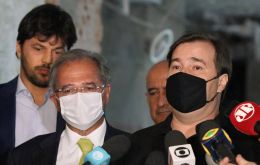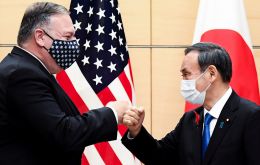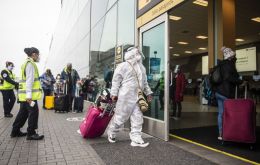MercoPress. South Atlantic News Agency
Stories for October 7th 2020
-
Wednesday, October 7th 2020 - 09:55 UTC
Paraguay declares national emergency as forest fires rage across Chaco

Paraguay’s Congress declared a national emergency as forest fires raged, burning vast swaths of the Chaco dry forest, home to sprawling cattle ranches, jaguars and many indigenous tribes.
-
Wednesday, October 7th 2020 - 09:51 UTC
Bolsonaro tells religious followers he plans to appoint an evangelical minister to the Supreme Court

Brazil's president Jair Bolsonaro said at an event with conservative evangelical Christians that he hopes to appoint an evangelical minister to the supreme court next year.
-
Wednesday, October 7th 2020 - 09:45 UTC
Premier Oil absorbed by Chrysaor, becomes the largest independent oil and gas group on London Stock Exchange

Shares in Premier Oil, with interests in the Falkland Islands, soared more than 14% on Tuesday, after the oil explorer agreed with a reverse takeover that will create the largest London-listed independent oil-and-gas group, producing more than 250,000 barrels of oil a day.
-
Wednesday, October 7th 2020 - 09:40 UTC
Brazilian economy minister and Lower House speaker agree to push reform agenda and social program

Brazil’s Economy Minister Paulo Guedes and the powerful lower house Speaker Rodrigo Maia announced a truce after more than a month of bickering over reforms and how to tackle a widening fiscal deficit. Local markets rallied.
-
Wednesday, October 7th 2020 - 09:35 UTC
UN human rights council condemns Venezuela and extends two years the mandate of investigators

The United Nations Human Rights Council on Tuesday extended by two years the mandate of investigators who have documented executions, disappearances, and torture in Venezuela that they say may amount to crimes against humanity.
-
Wednesday, October 7th 2020 - 09:22 UTC
Physics Nobel Prize for advancing the understanding of black holes

Three scientists won this year's Nobel Prize in physics on Tuesday for advancing the world's understanding of black holes, the all-consuming monsters that lurk in the darkest parts of the universe.
-
Wednesday, October 7th 2020 - 09:21 UTC
Quad group attempt a united front against increasingly assertive Beijing

US Secretary of State Mike Pompeo called on key Asian allies to unite against China's “exploitation, corruption and coercion” in the region, as he held talks on Tuesday in Tokyo.
-
Wednesday, October 7th 2020 - 09:08 UTC
Britain may boycott winter Olympics over China's treatment of Uighur Muslims

British Foreign Minister Dominic Raab suggested Britain may boycott the Olympics for the first time, over China's treatment of the Uighur Muslims, The Telegraph reported on Tuesday. The suggestion comes as a growing number of nations urge Beijing to respect human rights of the minority Uighurs.
-
Wednesday, October 7th 2020 - 09:02 UTC
Peru resumes international flights to seven countries in the region

Peru resumed international flights on Monday that were suspended in March as part of emergency measures to contain the spread of the novel coronavirus. President Martin Vizcarra led the resumption of flights from the capital Lima's Jorge Chavez International Airport, saying health regulations were put in place to combat the risk of infections.
-
Wednesday, October 7th 2020 - 09:02 UTC
Brazil purchases some 225,000 tons of rice from US, India and Guyana

Brazil has negotiated the purchase of 225,000 tons of rice from the United States, India, and Guyana, which are expected in the country during the second half of October and November.
